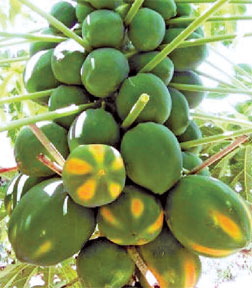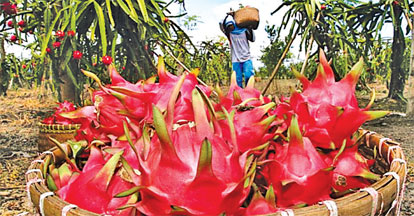Private-public partnerships vital to boost agri exports
by Lalin Fernandopulle
Agricultural research has got a fresh boost with growing interest for
more private-public cooperation to boost agricultural output, rural
income and food security.
 Private sector organisations work with universities and research
institutions to enhance non traditional crop exports to develop a
vibrant agricultural industry and ensure food security in the country. Private sector organisations work with universities and research
institutions to enhance non traditional crop exports to develop a
vibrant agricultural industry and ensure food security in the country.
The International Food Company (IFCO) and the Universities of Ruhuna
and Uva Wellasa have embarked on a series of research programs to
promote and develop non traditional agricultural exports through soil,
seed and irrigation development.
IFCO Chairman and Advisor to the Ministry of Agriculture, Sarath de
Silva said that vast progress has been made on research initiatives
launched with universities to enhance the yield, effective use of water
through dip irrigation, waste water management, use of sunlight to
enhance production, crop and soil development.
He said that agricultural research is essential to boost
productivity, profitability and sustainability of the agriculture
sector. Economically viable, environmentally sound and socially
acceptable agricultural research will assure the national food security
and development of the agricultural industry.
The need for a national agricultural research policy in Sri Lanka has
been a long-felt need for uniformity in decision-making in agricultural
research to achieve the long-term goals of the sustainable agricultural
development of the country.
"There is a big market for Sri Lanka's non traditional export crops
in the region. We should make good use of the Free Trade Agreement with
countries in the region to boost exports," de Silva said.
Sri Lanka exports fresh and processed fruits and vegetables to the
Maldives and the Middle East. The income from exporting fresh and
process fruits and vegetables has been around Rs. 3,000 million. The
target for this year is Rs. 4,000 million.
De Silva said the lack of production per plant and per acre have been
a major drawback to boost exports.
The private public partnerships in agricultural research are vital to
develop a vibrant agricultural sector, to enhance agricultural
production and reduce rural poverty.
Experts said that conventional approaches to research extension and
education are challenged by rapid changes in scientific and
technological innovations.
Food insecurity
They said cooperation between private and public organisations and
civil societies are important to reduce poverty and promote food
insecurity in the country. Result-oriented interactions help enhance
efficiency and effectiveness of research and education services,
enhancing access to new products and services that focuses on enhancing
the income of farmers.
It also helps promote pro-poor innovative activity in the food and
agricultural sector.
Studies have revealed that public sector organisations in Brazil,
India, Kenya, Mexico, and South Africa rely on cooperation with the
private sector and civil society to boost innovative capacity and
respond to the needs of the rural poor. It comprises public-private
partnerships, knowledge exchange networks, research consortia,
technology joint ventures, public-private-non-governmental extension
services, hybrid organisations, and other partnership-based approaches.
Agricultural research has also revealed that questions still remain
on how to make the best of use these collaborative ventures and how
partnerships facilitate innovative behaviour, how they reduce the costs
of innovation, and how they help public, private and civil society
organisations reach out to marginalised sectors are some of the issues
that need to be addressed.
De Silva said that interaction with universities in South India,
Malaysia and Thailand had shown the importance of private public
collaborations to develop agriculture, boost exports and enhance food
security in the country.
The results of private public collaborations will yield thrice the
amount that is spent on research which proves that the return on
investments on research is high.
He said that the Uva Wellasa University was invited to join in the
perennial crop horticulture on a 250-acre farm in Badulla. "We have
commenced bee-keeping, wormy-culture and growing 100,000 soursop plants
and plans are afoot to go for animal husbandry.
 "We have invited the Wayamba University to work at the Padeniya farm
where the Deduruoya project will provide water for 1,000 acres of
cultivation. We also plan to move to the North and the East. All these
joint venture research initiatives will help achieve the export target
of US$20 billion by 2020," de Silva said. "We have invited the Wayamba University to work at the Padeniya farm
where the Deduruoya project will provide water for 1,000 acres of
cultivation. We also plan to move to the North and the East. All these
joint venture research initiatives will help achieve the export target
of US$20 billion by 2020," de Silva said.
Dean of the Faculty of Agriculture Ruhuna University Prof. S.
Subasinghe said that the joint project between the University of Ruhuna
and IFCO (Pvt) Ltd. has yielded results in developing non traditional
export crops. Around 20 acres of land of the University of Ruhuna has
been allocated to IFCO to be developed as a research farm for export
crops such as banana, pineapple, dragon fruits and vegetables such such
as snakegourd, luffa, bittergourd, tomato and okra.
Research
He said the the university helps to develop technology through
research by undergraduate and postgraduate students and staff of the
University. University students and staff can use the facilities of this
research farm for their research. IFCO will provide all the assistance
in this regard.
The research farm produces lot of fruits and vegetables mainly for
export markets. At the same time they plan to purchase fruits and
vegetables from the farmers around the research farm. It also planns to
develop links with farmers around Kamburupitiya where the farm is
situated.Selected farmers will be provided all inputs (planting
materials selected fruit or vegetables or both, fertiliser and
agro-chemicals).
The research farm mainly focuses on organically grown fruits and
vegetable or minimum use of agro-chemicals, technical know-how and buy
back agreements. New knowledge developed by the students and staff
research will be disseminated to the farming community. All these
activities will help boost agricultural production and export volumes.
Dean of the Faculty of Agriculture, University of Uva Wellasa, Dr. G.
Chandrasena said that the research project between the university and
IFCO is a useful venture as it provides field training to students and
enhances research. Plans are afoot to send the first batch of students
to Paldeniya, Badulla.
"We hope to boost non traditional export crops and train
undergraduates to be entrepreneurs," he said. |

